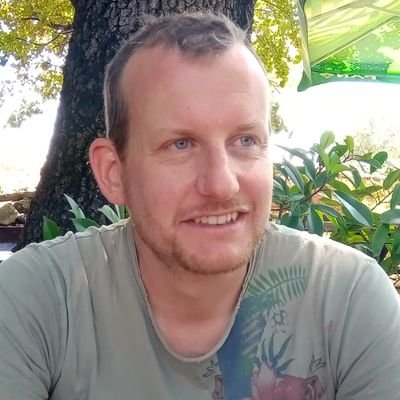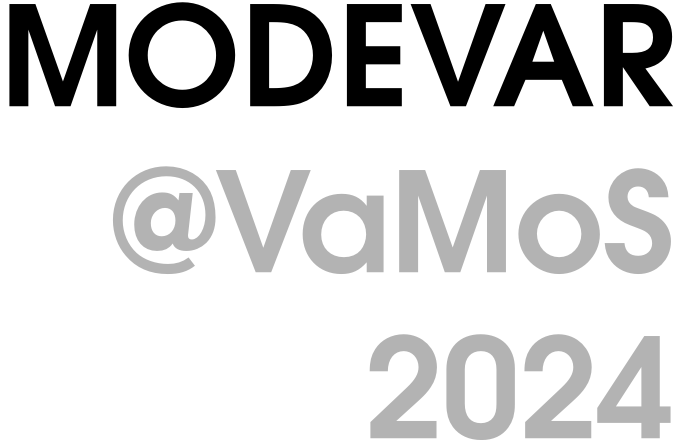Program
The MODEVAR workshop is planned as full day event at February 6th, 2024 in Bern. The main objective of the afternoon discussions is to reflect about the current challenges and potential avenues to be explored for variability languages.
| Program | Time |
|---|---|
| Welcome | 09:00 - 09:15 |
| Keynote: 24 Reasons Why Variability Models Are Not Yet Universal - Mathieu Acher | 09:15 - 10:15 |
| Coffee break | 10:15 - 10:30 |
| Paper: variability.dev: Towards an Online Toolbox for Feature Modeling | 10:30 - 11:00 |
| Paper: On the Challenges of Transforming UVL to IVML and Back | 11:00 - 11:30 |
| Paper: UVL Sentinel: a tool for parsing and syntactic correction of UVL datasets | 11:30 - 12:00 |
| Lunch | 12:00 - 13:30 |
| Current state (UVL) + tool demos | 13:30 - 14:15 |
| Breakout groups (1) | 14:15 - 14:45 |
| Coffee break | 14:45 - 15:00 |
| Breakout groups (2) | 15:00 - 16:00 |
| Closing | 16:00 - 16:30 |
Keynote
Title: 24 Reasons Why Variability Models Are Not Yet Universal
Speaker: Mathieu Acher, INSA, Inria, CNRS, IRISA
Abstract
Variability models (e.g., feature models) are widely considered in software engineering research and practice, in order to develop software product lines, configurable systems, generators, or adaptive systems.
Numerous success stories of variability models have been reported in different domains (e.g., automotive, aerospace, avionics) and the applicability broadens.
However, the use of variability models is not yet universally adopted… Why?
Some examples: variability models are not continuously extracted from projects and artefacts; each time a variability model is used, its expressiveness and language should be specialized; learning-based models are decoupled from variability models; modeling software variability should cover different layers and their interactions, etc.
The list is arguably opinionated, incomplete, and based on my own practical experience, but also on observations of existing works.
I will give 24 reasons to occupy your day as a researcher or practitioner in the field of variability modeling.
Bio
Dr. Mathieu Acher is Professor at INSA Rennes since 2022. His research focuses on modeling, reverse engineering, and learning the (deep) variability of software systems. Beyond its applicability, his research is original in combining software engineering and artificial intelligence techniques (symbolic reasoning, machine learning, generative AI). He is the author of 150 peer-reviewed publications in international journals and conferences. He co-chaired the program committee of SPLC 2017 and VaMoS 2020, and is a member of the steering committees of SPLC and VaMoS. His work has received an award for the most influential paper (SLE’19) and five best paper awards. He has been nominated for the CNRS bronze medal by Section 6 of the CNRS in November 2023. Since 2021, he has been a junior researcher at the Institut Universitaire de France (IUF). More information: https://mathieuacher.com/.

Accepted Papers
- Prankur Agarwal, Kevin Feichtinger, Klaus Schmid, Holger Eichelberger and Rick Rabiser On the Challenges of Transforming UVL to IVML and Back
- Tobias Heß, Lukas Ostheimer, Tobias Betz, Simon Karrer, Tim Jannik Schmidt, Pierre Coquet, Sean Semmler and Thomas Thüm variability.dev: Towards an Online Toolbox for Feature Modeling
- David Romero-Organvidez, Jose A. Galindo and David Benavides UVL Sentinel: a tool for parsing and syntactic correction of UVL datasets
Tool Demos
- Elias Kuiter Torte: feature-model experiments à la carte
- David Romero-Organvidez UVLHub
- Lukas Ostheimer, Tobias Heß variability.dev
- Hafiyyan Sayyid Fadhlillah V4rdiac - Delta-based CPPS Control Software Variability Management Tool Support
